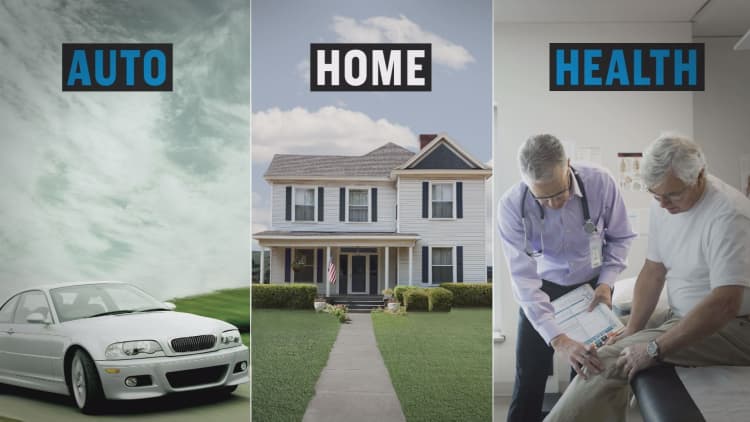
While the concept of insurance is pretty straightforward, the public generally does not understand its own needs, financial advisors say.
"People think automatically of home and auto insurance and have a comfort level with them," said Juli McNeely, certified financial planner with McNeely Financial Services and immediate past president of the National Association of Insurance and Financial Advisors.
But where it gets more difficult is with types of insurance that are not required, she said.
"Life, disability, long-term care — these are covering risks that could jeopardize your future savings plans, and they have their own complexities," said McNeely.
Consumers are missing the boat in many ways.
Life insurance. People tend to be grossly uninsured on the life insurance side, McNeely said, because they believe they're invincible. They think they can't afford it, and they lack the knowledge about the need.
"I've also heard of husbands saying they weren't worried about getting life insurance because 'she's going to get married again,'" she said.
Keith Gillies, CFP and CEO of United Wealth Advisor Group, said that when it comes to life insurance, "people don't understand what an amount does and doesn't do."
"Five hundred thousand dollars sounds like a lot — until you do the math," he added.
Long-term care. People also don't understand major risks of not getting long-term care insurance, Gillies said. "On the financial side, even if you don't go into a facility, what if you need to hire caregiving help?" he asked. "And if you have a caregiver spouse, what about the risks to their own health?"
More from Advisor Insight:
Most consumers confused about credit
Alternatives to big banks and their high fees
What to ask about your workplace benefits this fall
People simply don't want to face the issue, said Jennifer Alford, president of Creative Financial Partners.
The biggest misconceptions she sees around long-term care — and her responses to them — include:
"It's too expensive." But this depends on your age at sign-up.
"It's only nursing-home insurance." However, there now many more options, including home care and assisted-living coverage.
"I'll never use it." There are now return-of-premium options available (e.g., if you pass away without using the insurance, funds can be returned to your family, or your benefit could pass to your to spouse).
Disability insurance. Most people — in particular, the young — believe nothing bad will happen to them, said McNeely. However, according to the Social Security Administration, about 25 percent of today's 20-year-olds will become disabled before reaching age 67.
People are often not aware of certain options, she said, such as the waiver-of-premium rider. This rider covers premium payments if insureds become disabled, thereby enabling them to hold on to the existing policies they've started drawing benefits from.
"They don't understand some of the complexities, like how long to pay and how quickly the policy should kick in," McNeely said. "Shorter elimination periods result in higher premium costs, which brings up the importance of having short-term savings for three to six months of living expenses."
Brock T. Jolly, CFP and partner with Veritas Financial, said people don't understand "the trade-offs between costs and benefits and the fine print."
"They don't take the time or have the interest or expertise and, as a consequence, are taking on more risk than they probably should be," he said.
People often think insurance is too complicated. But it is a similar idea to getting a mortgage — just using calculations.Jennifer Alfordpresident of Creative Financial Partners
In the case of disability insurance, Jolly said, employees often think they have coverage at work, but generally they are only covered for 60 percent of their base salary, are not covered for bonuses and don't realize the benefit can be taxable when used. People also don't realize they can and should get a supplemental disability policy for the rest of the coverage.
Umbrella. Individuals also don't understand the need for umbrella insurance, Jolly said. These policies cover claims that go over and above coverages of regular policies, such as those for auto and home.
"What if you have a $1 million car accident and your coverage is only $300,000?" he asked.
Umbrella policies can cover certain "red-flag issues" that people get sued for, caused by teen drivers, carpooling, trampolines, swimming pools and so forth, Jolly added.
Yet consumers feel overwhelmed when they do look for help. "I do think the industry makes it ambiguous about who offers what type of product," said Mark Acre, president of OneSource. "For people seeking information, it's like drinking from a fire hydrant."
This underscores the need for a financial advisor to act as an intermediary, he said. An advisor can ask clients about specific needs and interests and then shop the insurance market.
"At the end of the process, instead of worrying about the company [issuing the policy], the costs and the type of policy to pick, you simply know that your needs are being met," Acre said.
"People often think insurance is too complicated," said Alford at Creative Financial Partners. "True, it's not like setting up a savings account at a bank. But it is a similar idea to getting a mortgage — just using calculations," she added. "It's not complicated; it's just math."
— By Deborah Nason, special to CNBC.com





